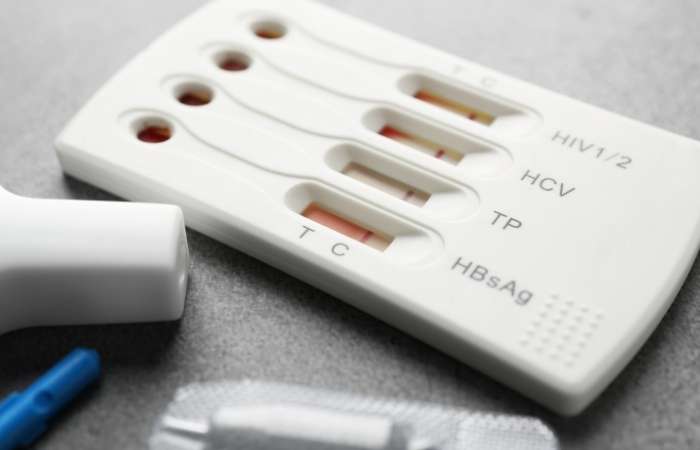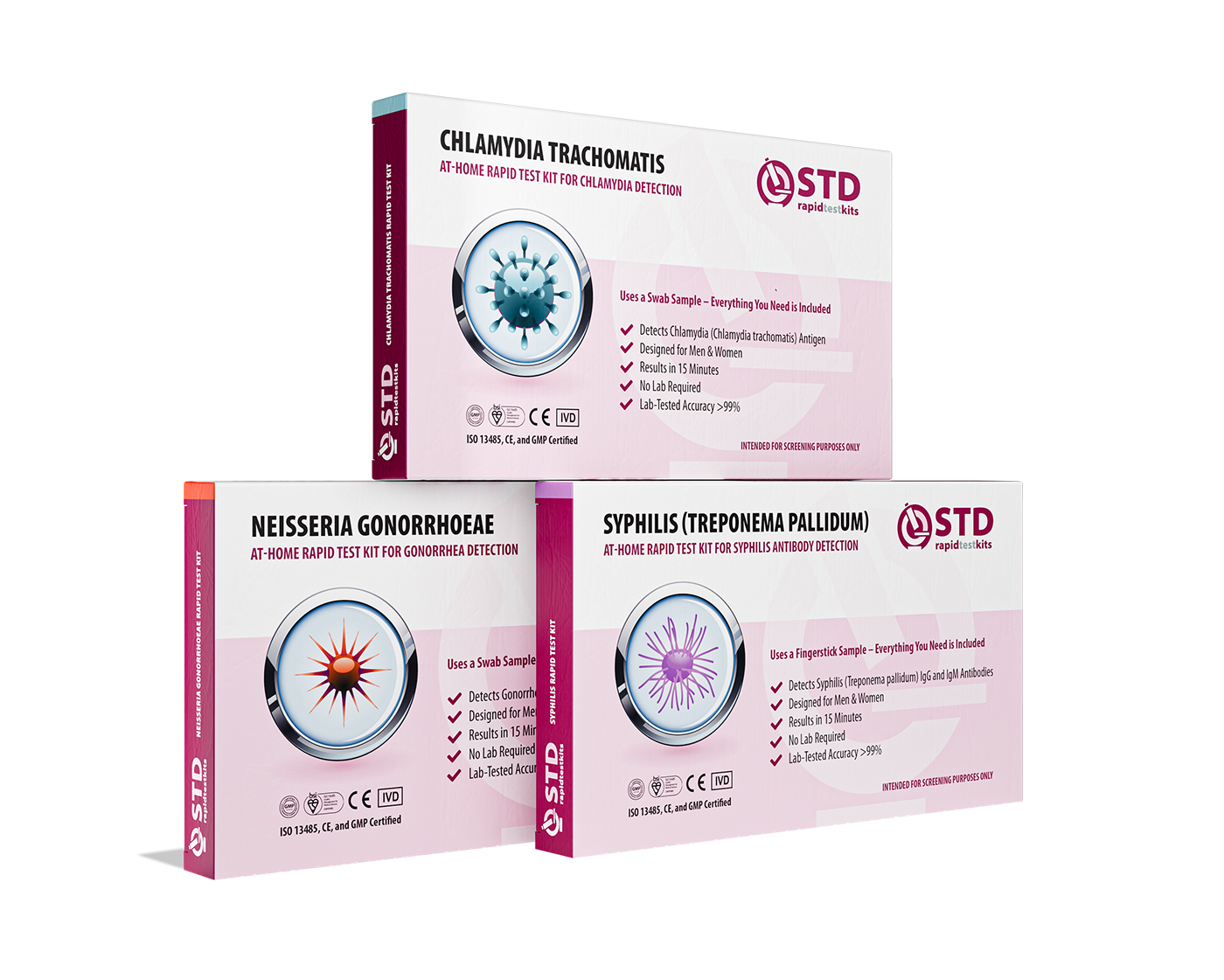When It’s Quiet… But Dangerous: Understanding “Silent” STDs
Some STDs don’t announce themselves. No burning pee, no unusual discharge, no pain during sex, just business as usual. That’s the terrifying part.
Chlamydia and gonorrhea are two of the most common sexually transmitted infections in the world, and both often show no symptoms in people with penises. According to the CDC, over 70% of men with chlamydia are asymptomatic. That means they can carry the infection for months, or even years, without knowing.
While things might seem fine on the outside, these infections are causing microscopic war zones inside the male reproductive tract:
- Inflammation: Especially in the epididymis and testicles (epididymo-orchitis)
- Scar tissue: Blockages can form in the vas deferens (the tubes that carry sperm)
- Sperm destruction: Oxidative stress and white blood cell attacks can degrade sperm quality
That’s why doctors call them “silent but aggressive.” They might not hurt today, but they can haunt your fertility tomorrow.

People are also looking for: Which Antibiotic Kills Chlamydia the Quickest?
Why Sperm Takes the Hit: The Biology Behind It
Sperm isn’t fragile, but it is exposed. Unlike eggs, which are tucked inside the ovaries, sperm is produced constantly and moves through delicate tubing.
Here’s how these STDs compromise sperm:
- Chlamydia: Can attach to sperm cells directly, impairing their motility. Inflammation also disrupts hormone signaling and temperature regulation inside the testes.
- Gonorrhea: Often causes scarring or pus buildup in the reproductive tract, blocking sperm passage or degrading the seminal environment.
A 2021 meta-analysis in Reproductive Biology and Endocrinology found that men with untreated STIs showed a consistent decrease in both sperm concentration and motility, two major predictors of fertility.
And the scariest part? You don’t have to feel sick for this damage to happen. It occurs in the background, while you’re living life, having sex, and possibly trying to conceive.
The Quiet Destruction of the Epididymis
If you’ve never heard of the epididymis, you’re not alone. It’s a tiny, tightly coiled tube sitting on top of each testicle, responsible for storing and maturing sperm. It’s also a favorite target of STDs.
Epididymitis is an inflammatory condition commonly caused by untreated chlamydia or gonorrhea. Symptoms, if they show up, might include:
- Mild testicular pain or swelling
- Tenderness in the groin
- Fever (in some cases)
Left untreated, this inflammation can:
- Block sperm transport
- Alter hormone signaling
- Damage the sperm itself
A study in Frontiers in Cell and Developmental Biology noted that bacterial infections directly elevate oxidative stress levels, which alters the DNA integrity of sperm, a major concern for both conception and future offspring health.
Check Your STD Status in Minutes
Test at Home with RemediumChlamydia & Gonorrhea Test

 For Men & Women
For Men & Women Results in Minutes
Results in Minutes No Lab Needed
No Lab Needed Private & Discreet
Private & DiscreetOrder Now $49.00 $98.00
For all 2 tests
Fertility Fallout: What the Research Says
Let’s get into the numbers. These aren’t fear tactics; they’re just facts:
- Men with a history of chlamydia are 3–5 times more likely to show abnormalities in sperm count or motility
- Gonorrhea can cause irreversible damage to the vas deferens, resulting in azoospermia (no sperm in the semen)
- In a review of 2,000 male infertility cases, nearly 15% were linked to undiagnosed or untreated STDs
These findings come from research published in journals like Andrologia, Human Reproduction, and The Lancet. The connection between infection and infertility isn’t just theoretical, it’s a statistical reality.
Silent STDs and Emotional Fallout
Let’s get real for a second. This isn’t just about biology; it’s about grief, shame, and a sense of betrayal by your own body.
Here’s what some men have reported in counseling sessions:
“I thought I was fine. I never had symptoms. I didn’t even know I had an STD until we started trying to get pregnant and nothing happened.”
“It wasn’t just infertility, it was the guilt of having passed it to my partner without knowing.”
That emotional weight is real. It’s heavy. But the truth is you’re not alone, and this isn’t a death sentence for your fertility. Early action can change everything.
Time Doesn’t Heal This: The Problem With Waiting
Many people assume, “If I had an STD years ago, and it went away, I’m probably fine now.” Unfortunately, that’s not always true.
These infections don’t need to be active to cause damage. The scarring, blockage, and sperm damage may continue or remain even after the bacteria are gone.
That’s why it’s critical to:
- Get tested if you’ve ever had unprotected sex, even if it was years ago
- Ask a fertility specialist for a full sperm analysis if you’re trying to conceive
- Rule out complications like epididymitis, testicular scarring, or hormonal imbalance

People are also looking for: How often should women test if in a monogamous relationship?
Reversibility: Can Fertility Be Saved After an STD?
The good news: not all damage is permanent. Fertility after a silent STD is a spectrum, not a yes-or-no verdict.
Here’s what research and reproductive specialists say:
- If caught early: Antibiotics like doxycycline or ceftriaxone can clear the infection and prevent long-term damage.
- If scarring has occurred: Surgery (such as vasovasostomy) may help restore sperm flow.
- If sperm quality is low: Antioxidant therapy, hormone management, and assisted reproduction (IUI, IVF) are options.
In one clinical study, men treated within 12 months of a chlamydia infection had a 70% recovery rate in sperm parameters. That number dropped drastically for those who waited over 2 years to seek treatment.
Bottom line: the sooner you test and treat, the more likely you are to preserve fertility.
Testosterone, Inflammation, and Your Sex Drive
A lesser-known consequence of untreated STDs? Hormonal chaos.
Chronic inflammation from infections like gonorrhea or chlamydia can disrupt testicular function, lowering testosterone levels. That can lead to:
- Low libido
- Erectile dysfunction
- Mood changes or fatigue
While it’s easy to chalk this up to “stress” or “getting older,” hormone testing can reveal the deeper story. In some cases, testosterone rebounds after infection treatment, but other men may need long-term support from an endocrinologist.
Tip: If your sex drive has dropped alongside fertility issues, it’s worth checking both your testosterone and STD status.
When the Body Attacks Its Own Sperm
Here’s a bizarre twist: some infections actually trigger your immune system to turn on your own sperm.
This condition, called autoimmune infertility, occurs when the blood-testis barrier is compromised, often by infections or trauma. The body then produces antibodies that “kill” or immobilize sperm.
Up to 12% of men with unexplained infertility test positive for antisperm antibodies, and many have a history of untreated or silent STDs.
There are ways to treat it (like corticosteroids or ICSI), but early diagnosis is key. If you're dealing with fertility issues, don’t skip over infection screening. It’s not just a “STD check”, it could explain the whole picture.
Check Your STD Status in Minutes
Test at Home with Remedium3-in-1 STD Test Kit

 For Men & Women
For Men & Women Results in Minutes
Results in Minutes No Lab Needed
No Lab Needed Private & Discreet
Private & DiscreetOrder Now $69.00 $147.00
For all 3 tests
Fertility Testing for Men: What to Ask For
If you're worried about past STDs and your ability to conceive, these are the key tests to request:
- Semen Analysis: Checks volume, count, motility, morphology, and DNA fragmentation
- Chlamydia & Gonorrhea Tests: Nucleic acid amplification tests (NAAT) are the gold standard
- Testosterone Panel: Looks for low T or hormonal imbalances
- Scrotal Ultrasound: Can detect epididymal damage or testicular changes
- Antisperm Antibody Test: If other results are normal but pregnancy isn’t happening
How to Talk to a Partner About Past Infections
This conversation is hard. But it’s necessary, especially if you’re trying to conceive or facing fertility challenges as a couple.
Some tips:
- Lead with transparency: “I didn’t have symptoms, but I learned some STDs can still cause damage…”
- Use medical facts, not fear: Link to articles or show test results to explain your concerns
- Offer mutual testing: This creates shared responsibility and removes shame
And remember, many people carry STDs without knowing. Blame has no place in this conversation. Focus on health, hope, and what you’re building together.
Case Study: “We Never Knew Until It Was Too Late”
James, 33, and Ariana, 31, had been trying to conceive for over a year.
“We were both healthy. No major issues. Just… nothing was happening,” James shared.
After a full fertility workup, doctors found that James had near-total motility loss and antisperm antibodies. The suspected cause? An untreated chlamydia infection from college, never diagnosed because he had no symptoms.
“I felt blindsided. Like my past was stealing my future.”
With IVF and ICSI, they eventually conceived. But it came with thousands in costs, and months of emotional recovery.
This is why early testing isn’t just smart. It’s protective.

People are also looking for: If I want to buy a test kit that I can use at home, do I need a prescription ?
FAQs
1. Can chlamydia cause permanent infertility in men?
Yes, if left untreated, chlamydia can cause scarring in the vas deferens or damage sperm quality, sometimes leading to permanent infertility.
2. How do I know if a past STD hurt my fertility?
You won’t know without testing. A semen analysis, hormone panel, and STD screening are the best way to assess hidden impacts.
3. Can sperm recover after chlamydia treatment?
Often, yes, especially if the infection was caught early. Many men see improved sperm parameters within 3–6 months after treatment.
4. Do silent STDs always cause infertility?
No, not always. But they raise the risk significantly, especially if they affect the testicles or go untreated for over a year.
5. How long can chlamydia or gonorrhea live in the body?
Indefinitely, if untreated. These infections can persist for months or years without obvious symptoms, continuing to cause internal damage.
6. Can I get tested for chlamydia and gonorrhea at home?
Yes. The Chlamydia + Gonorrhea Home Test lets you test from home with lab-level accuracy and fast results.
7. Does ejaculation hurt if I have an STD?
Sometimes, but not always. Some men experience pain, burning, or strange discharge. Others feel nothing at all.
8. What if my STD was treated years ago, am I still infertile?
Possibly, but not definitely. You’ll need fertility testing to know if past infections caused permanent damage.
9. Is it worth getting tested even if I have no symptoms?
Absolutely. Most men with chlamydia or gonorrhea are asymptomatic, and the only way to protect your fertility is to get screened.
10. Can I still make a baby with low sperm motility?
Sometimes, yes, with help. Options like IUI or IVF with ICSI can assist even in severe cases of low motility.
You Deserve Options. Get Tested
Infertility isn’t always about age or genetics, it can be about something you never felt, never saw, and never knew to treat.
Silent STDs like chlamydia and gonorrhea don’t just stay “down there.” They can quietly sabotage your sperm, scar your reproductive system, and damage your chances of building a family. But here’s the part that matters most:
It’s not too late to find out. And it’s not too late to act.
Getting tested, especially from the comfort of home, is a powerful first step. Whether it’s peace of mind or a wake-up call, you deserve answers. You deserve options. And you deserve to protect your future, starting now.
Sources
1. Reproductive Health FAQ – CDC
2. The Impact of STIs on Fertility – ASHA
3. Are STIs Associated with Male Infertility? – PMC
4. Bacterial Infections and Male Fertility – Frontiers
5. PMC – Effects of Chlamydia trachomatis Infection on Fertility: A Case Series










